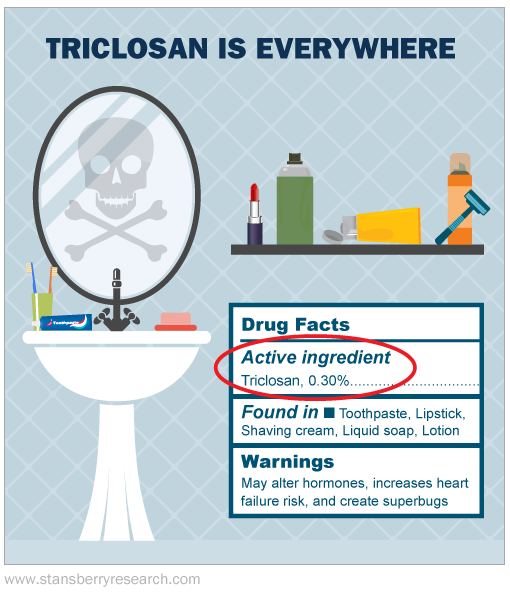Antibacterial soap isn't just a useless marketing gimmick... it could actually stop your heart.
Each flu season, many folks reach for antibacterial soap to "protect themselves." Don't be one of them...
A new study from Korea University, published in the Journal of Antimicrobial Chemotherapy, found that antibacterial soaps are no better at cleaning your hands than plain soap.
Researchers tested the effectiveness of antibacterial soap and plain soap on 20 bacterial strains. There was "no significant difference" in the amount of bacteria each soap killed.
Researchers also looked at how the soaps work in real-world conditions – how consumers would actually use them for handwashing – and, again, found no significant differences.
The only difference came nine hours later, when the antibacterial soap showed greater effectiveness. But unless you're going more than nine hours without washing your hands, there are simply no advantages to using antibacterial soap.
But here's the thing... antibacterial soap is worse than useless. It's dangerous.
Triclosan is the main ingredient that makes many of these products "antibacterial." It's found in about three-quarters of liquid antibacterial soaps and one-third of bar soaps.
A study of 224 households from the University of Michigan School of Public Health found that families using antibacterial soap were no healthier than families that use regular soap. This study also reviewed other studies that found triclosan alters hormones. This can cause developmental and reproduction problems.
That's not the only risk...
In a study published by the scientific journal Proceedings of the National Academy of Sciences of the United States of America, researchers from the University of California found triclosan reduces muscular strength and cardiac function of heart tissue... increasing the risk of heart failure.
Antibacterial soaps also help create "superbugs"... Repeatedly exposing bacteria to the same chemical – like triclosan – builds up their resistance, creating drug-resistant strains of germs.
The U.S. Food and Drug Administration (FDA) has taken notice.
In 2013, the FDA proposed a new rule "to require manufacturers of antibacterial hand soaps and body washes to demonstrate that their products are safe for long-term daily use and more effective than plain soap and water in preventing illness and the spread of certain infections." In the FDA's statement, the agency acknowledged no data supports the effectiveness of antibacterial soaps.
In 2014, Minnesota took a huge step toward helping Americans avoid dangerous products. The state voted to ban products containing triclosan. However, the law doesn't take effect until January 1, 2017, and it doesn't apply to products with FDA approval.
[optin_form id="161"]
This June, the European Chemicals Agency announced that the use of triclosan in hygiene products would be phased out in the European Union. In 2010, the European Union had already banned triclosan from products that come in contact with food.
But don't wait for government bureaucrats to tell you to stop using antibacterial products.
We first told Retirement Millionaire subscribers to stop washing with antibacterial soap in January 2011. It's doing more harm to you than good.
Do what I do and scrub your hands together vigorously in water for 15-20 seconds. Occasionally, I'll use a little bit of regular bar soap if my hands are really dirty.
Let your body do its job and fight germs for you. Unless you're a doctor, you don't need to do more. Simply removing some of the germs will keep you healthy – especially during cold season.

